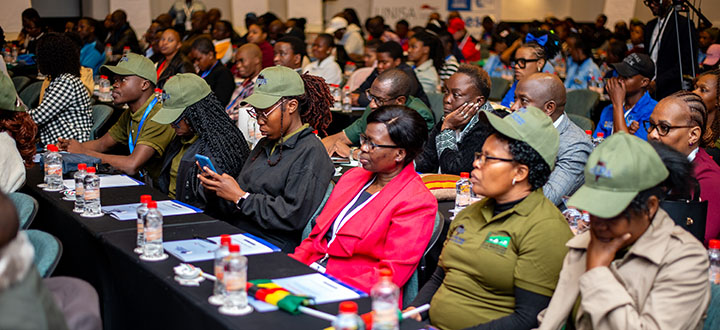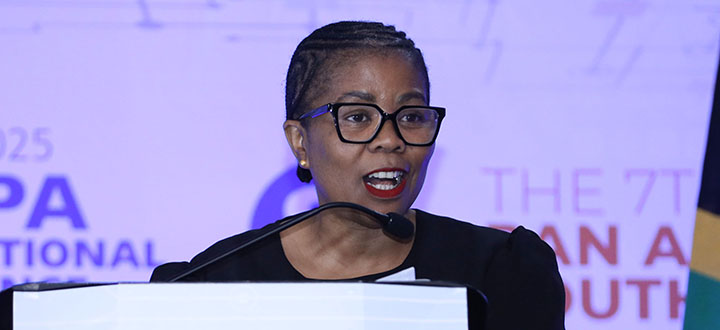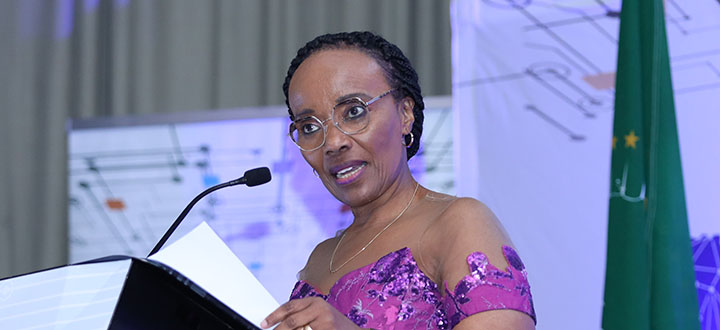News & Events
Young African minds poised to leapfrog Africa’s digital divide

Attendees of ATUPA’s 7th Pan African Youth Forum
On 25 August 2025, Unisa, in collaboration with the Association of Technical Universities and Polytechnics in Africa (ATUPA), hosted the 7th Pan African Youth Forum, where young African minds gathered to collaborate on innovative, tech-driven solutions to leapfrog Africa’s digital divide, under the theme Innovate, lead and thrive: Empowering Africa’s youth for sustainable development and digital transformation.
Committed to the renewal of Africa’s development
In her welcome address, Unisa Principal and Vice-Chancellor (VC), Professor Puleng LenkaBula, said that the forum affords an opportunity for reflecting on and finding solutions to the challenges facing Africa’s youth. She added, “Recent statistics from the World Bank said that over 400 million young people worldwide lack the skills they need in employment, entrepreneurship, and active participation in society. This figure requires sustainable action plans from governments, businesspeople, industry, institutions of higher learning, and other social partners in society.”

Prof Puleng LenkaBula, Unisa Principal and Vice-Chancellor
Continuing, the VC cautioned that automation and artificial intelligence (AI) could displace over 90 million jobs by 2030, because, she said, “they require entirely different skillsets, while on the other hand, our education and training system is grappling with the quality and pace of the ever-evolving technology.” She remarked that many young people complete their qualification without being adequately equipped with foundational, digital and transversal skills, which are the prerequisites to thrive adequately in this age.
The VC stated that marginalised groups such as girls, rural youth, refugees, and persons with disabilities face even steeper barriers to accessing quality education, training, and opportunities, noting that without comprehensive reforms in Africa’s education systems, the digital divide threatens to deepen and further exacerbate existing inequalities.
“Whereas Africa is the least developed region of the world,” noted the VC,” it does not mean that its development trajectory must be eluded by the opportunities that he 21st century and the fourth industrial revolution affords. Therefore, Africa can leapfrog the divide and reclaim its civilisations and intellectual futures.
Serious about Africa’s development
Concluding, the VC stated: “It is for this reason that the Agenda 2063 enjoins us to work toward strategic goals of well-educated citizens and a skills revolution underpinned by science, technology and innovations aligned with the United Nations’ Sustainable Development Goals. I truly believe that the Youth Forum and ATUPA are fully aligned with and seek to advance these strategic goals and show the rest of the world that we are serious about Africa’s renewal and sustainable development.”
Reclaiming Africa’s intellectual sovereignty
In her keynote address, the Honourable Sindisiwe Chikunga, Minister in the Presidency for Women, Youth and Persons with Disabilities, said that transforming the structures that hold back young women and young people is not an elusive task but rather a feasible target central to building a just, digital and sustainable Africa.

Sindisiwe Chikunga, Minister in the Presidency for Women, Youth and Persons with Disabilities
Chikunga continued by saying that Africa’s struggles are not only about economics. They include a variety of hindrances keeping Africans moving forward. She explained: “They encompass identity, direction and power – this additionally includes how we think about ourselves and regard our history and culture. Therefore, to unlock the promise of the African Union’s Agenda 2063, we must think anew what the era of colonialism did to our institutions, economies and self-perceptions, and begin building the Africa we want and reclaim our intellectual sovereignty.”
Chikunga remarked that the Youth Forum’s theme boldly expresses the right mindset that Africa’s youth must embrace in the 21st century for the continent to thrive in the era where the world is fully embracing digital innovation, automation and artificial intelligence. “Innovation, transformation and sustainability must serve as tools of liberation, rooted in Pan-African history,” she added.
Concluding, Chikunga remarked that Africa's youthful population presents a significant opportunity. She said: “According to the United Nations’ projected figures, Africa has the youngest population in the world, with over 400 million people aged 13 to 35, and with one in three young people globally projected to be African by 2030. Therefore, the continent's demographic dividend can be harnessed. This opportunity is poised to be leveraged by expanding the African Continental Free Trade Area (AfCFTA) to unlock new trade possibilities and foster economic growth, promote Africa-centric development programmes, and fast-track Africa’s digital aspirations.”
* By Godfrey Madibane, Acting Journalist, Department of Institutional Advancement
** Photography by the Unisa Multimedia Centre
Publish date: 2025-08-28 00:00:00.0

